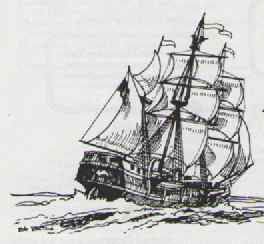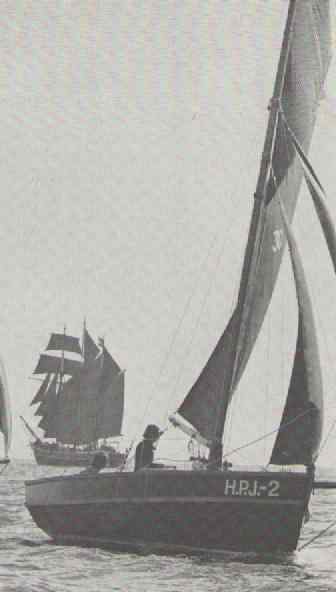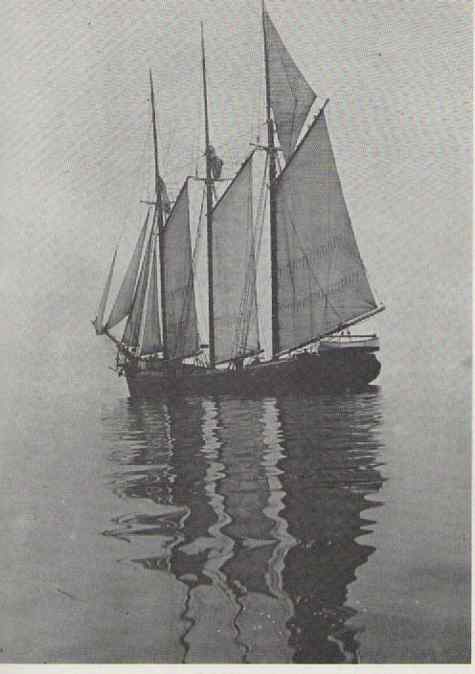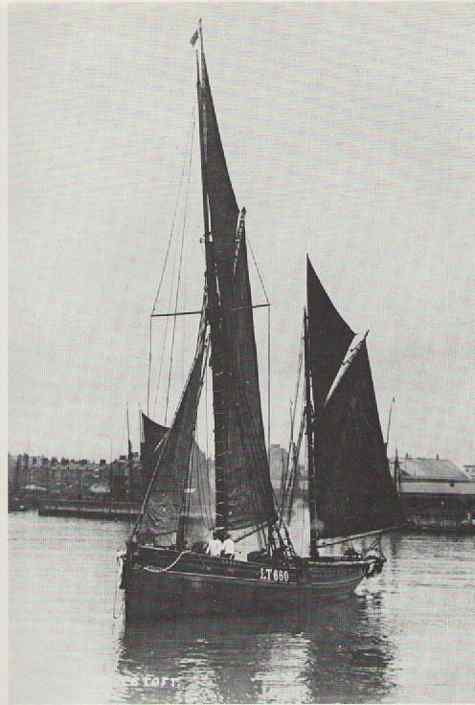If you can imagine a table by the window of a harborside tavern, somewhere around 1880, a town by the sea...the day is grey, misty and cool with but a hint of a coming wind. An old white-bearded captain no longer of the sea, leaning on the checkered cloth table, sipping rum with his pipe in one hand, staring out the window.
At the table near him, a leather-faced seaman, alone, sees the old man, recognizing him from some far-off past voyage.
‘So,’ the younger man says out loud toward him, ‘it’s come to rum and a window, eh, Captain?’
The old man didn’t move, but he said, ‘It has. The sea has outlived me, though I don’t regret it, any of it. But now, who might you be, laddie?’ Then he turned his wrinkled old neck.
‘I was a boy before the mast when you took us around the Horn in a 3 sticker topgallant full of cargo, the Relentless, out of Marstal, I was. And you drove us well into and through gales and typhoons and cruel currents that seemed to call out for reefs. I remember.’
‘I do..sometimes. Those were salty times, lad. Don’t ever forget them.’

‘Couldn’t if I tried. But your times have gone to the mists. The old days of yards and spars screaming around the Horn are probably over.’
‘They may be, lad, but the skills we all learned will be out there to be found as long as the seas await and winds flog the sky. Now it’s all them steamers and draggers and diesel. Damn, ain’t no use for that black soot on the sea. Next thing you know, you’ll wake up an’ there won’t be no gaffs at all, no spars, just that skinny little foresail on the mast…’
‘Oh you mean the Bermuda rig, well I can’t say I blame you for turning away from it, but it does sail to windward, you know. Even the older captains say that.’
‘Ay, lad, they may say, but if a ship can’t move in the sea a gaffer with good lines will get home before them Bermudans will. It ain’t just the ‘cut o’ yer jib’ as Long John says, it’s as well the turn of the model that makes a windward passage, I tells ya.’
A couple of the old boys, who were fingering their beards while the old Captain put this out then turned in their chairs to face the old man.
One of them, Bungie Morecambe, had sailed out of Cardigan Bay, years ago, so long time past he couldn’t even remember the year. He was one of those old salts with thin eyes aslant, a few teeth lost at sea, who had an opinion on everything, even if he was wrong. So he spoke up.

‘Now, now Captain, you aint’ gonna say an old topsail schooner could beat one of them newfangled racing cutters Herreshoff builds, is you?’
The captain’s eyes sparkled. ‘Put it fair--same waterline, same sail area, four points o’the compass to sail on three points of wind and a topsail clipper schooner will stay with them racing cutters in the sea. Now close to shore, maybe not, but across an ocean, when the wind shifts its finger, a gaff will hold its’ own.’
Just then one of the younger seamen who’d come in this afternoon for a drink, waiting for the tide, he turned around at the old captain. He had a black beard, shining teeth like a fence of steel, burning black eyes and sunburned skin like sandpaper. He wasn’t going to just let this go by.
Luke Hamble by name, he slapped down the bottom of his glass hard on the bar, saying, ‘That’s a mighty big swallow to take. Can’t for the life o’ me see how an old gaffer would keep up with these new ships, old man. A Bermudan ain’t gotta wait on favorable winds and tides. It can ship out on schedule.’
The old captain looked up into Hamble’s black eyes, seeing something of himself forty years before. He said, ‘It’s cause a gaff can adjust to shifting winds, lad. A lugger might beat it off the wind, but that’s only one finger of the compass. A gaff schooner can turn without losing knots, then find it’s trim again, and surge with the breeze. Them Bermudans lose all their wind too easy with their ragged leech, since they ain’t got much stitching to hold the wind with, it needs a big foresail to fill with wind from luff to leech, to handle the wind on the lee of the mast. But with two sticks, a gaffer can kidnap the wind, keepin’ it till the next puff comes along.’
Bungie then said,’He’s right Hamble. The gaff came around for the coastal voyages around the British Isles, revenuers, packets, naval dispatch ships and the like where the wind changes.’
‘That’s when the models were fat and short, seaworthy, stout. But then that fool Humphreys built frigates 200 feet long.’
Bungie said, ‘That’s when they had to make booms so long, they were more like slinghots in a tack. So along came schooners. Two masts, two booms not very long, three sails. Less men, but faster voyages. And them yacht owners, all in their satin whites and such, they cut off the boom on their cutters, added a mizzen. It didn’t make cutters faster, but they could maneuver.’
The old captain couldn’t help himself from chiming in. ‘That ain’t what makes a ship fast, laddie,’ he said aiming at Luke.
Luke, never one to back down, wasn’t gonna take anything from an old geezer, no matter who he was.
Luke threw back at him, ‘So, tell me, old man, what makes a ship fast? You ain’t gonna say, old canvas and deadeyes, is you?’
The old captain smiled. ‘No, ain’t gonna say that. Once back in ‘44 we wus all shipwrecked on a South Seas island, living in a hut with whisky an’ natives, waiting for a shipment of planks to repair our ship to get us to Java. Well one night we talked all around about this, breathin’ the campfire smoke and drinking rum and lookin’ at native girls, so this is what we said.
‘It ain’t the flare at the forefoot, that just makes a ship pound like a porpoise diving and rising up; it ain’t the clipper bow or a cutter bow or any bow at all. It ain’t the bilge--hard or soft--it’s all about the run. You gotta have a long sleek after run with a deep keel at the rudder to have speed. An’ when you tack, you have to tack from fore to aft, not with the mainsail first, if’n you know what I mean. That way, you run yer ship through the tack instead of gettin’ thrown back an’ sloshed until the sheets whine across the deck.’
The murmurs around the tavern said the old captain was right. They all thought about ships they’d been on that couldn’t turn in half an ocean and ships that could.
But Luke wasn’t through, not just yet.
He said, ‘So you think just stop designing ships, keep what we’ve got, lost at sea, freight arriving late, old ships an’ old men like you.’
Bungie laughed. ‘You know he’s right, Captain. It was changing that produced the gaffers and schooners and ketches, an’ it’ll be changing for the better that’ll bring about whatever’s the next working boat. Square riggers couldn’t always make a deadline in a calm, unless it was a clipper with 200 men for a crew. That’s why schooners came about, fewer men, faster at the wind’s eye, less sail and less tragedy. An’ a ketch takes less crew than a schooner, got more deck room, an’ it’s a helluva sight easier to handle the sails.’
‘Yeah,’ the captain piped up,’but ketches ain’t got the ability to trim sails, too much spoilin' the wind, not enough sail area. The only thing a ketch can do is slow down in a blow.’
Bungie took a swig of whiskey, wiping his mouth with his sleeve. ‘Two masts like a ketch can balance a ship so the helmsman can leave the wheel for a while. No ship makes time in a gale, you make it on long passages with the wind abeam, you make it in a steady sea, that’s for sure.’
The men in the tavern agreed.

One of them, a shrimpy little rat faced seaman, Guthrie Kemp, walked to the door, then halted to say to the old captain, ‘Still I’ll take a workboat any day, an old crabber with pole mast, 30 footer with a center plate any day over yer schoonies. I’ll make a living outta that ship, she will.’ Then he went out, slamming the door. He’d had his say, he wasn’t listening to anyone else.
Luke said, ‘So what’d ya think of that, workboats--ha! It’s steam today, that’s what the future is an’ what men’ll swear by. Not pitching like a kite, no men lost at sea in dorys, no crying women standing on their rooftops looking for a ship that ain’t never coming home. You all’s gotta see the sense in that.’
Bungie said, ‘In a way I do. After all what made the need for schooners? It was lumber all over New England that you could build ‘em long to carry freight along the coast It was haulin’ coal from Newport News to New England for the textile mills that did it. It wadn’t any sentiment about the rig. An’ that four sticker, the William White, was for haulin’ cargo at a profit. If’n it wadn’t for the hogging, we’d still be seeing them wood schooners today.’
‘That’s the gospel truth,’ Luke said. ‘What we’s doin’ now is hauling lumber from Nova Scotia in exchange for the coal coming from Virginia. A fair trade, an’ as long as it’s profitable the three and four masters are gonna get built. It ain’t style, old man, it’s profit and the changing times. You gotta change with the times if you wanna keep up. That might not be what you like to see out there through that window, but it’s what a man has to do to feed his family.’
‘I can attest to that,’ a fellow leaning on the bar said. None of the old salts knew him, he was a young fellow with that wiry thinness of youth. He had heavy eyebrows, a jagged sunken face with a squared chin. ‘I just came across from Ireland where my boss sailed his schooner with potatoes from Ireland for Liverpool. He’d sell ‘em and return with coal from Garston. Works for him, but I don’t know how long.

‘One thing I do know, smacks are working with gaffs on ‘em. They ain’t as big as your schooners, but you can haul em’ out across a tide or a calm, to get to sea. They’s all ketches, to leave room for fish in the holds. I seen one from Lowestoft, a round counter stern with the pole near abouts to the capstan. They landed fish on the shore, so they could haul coal and ice.’
‘How tall was the pole?’ Luke asked.
‘So tall we needed a steam capstan to get the mainsail up. Then we ran out the bowsprit ‘cause the jib trims the ship. Trawling was six hours on the tide. Once we were so tired, the captain didn’t use the sails at all, just the running tide. It was hard work and dangerous if the summer topsail fell to the deck. One time it did, it threw me across the deck in the air. I ain’t no bird.’
The old captain finally finished his rum, saying, ‘How long do your smacks last, made of wood?’
The fellow scratched his chin hard enough to start kindling. ‘Near as I can guess, near abouts 25 years.’
‘Seems to me,’ the old captain said, ‘that’s pretty good life for a man. Longer than these youngin's stay at any job.'
The fellow said, ‘For them that’s lived that long. But makin’ a few shillings is getting harder. Fishing is now dragging, not like the old days. Some of them smacks get lower rigs, become yachts. They’re rugged like a mountainside, last forever if you keep ‘em caulked good an’ tight.’
‘That’s what I been saying,’ the old captain said with a slant smile across his face. ‘A wood gaffer’ll last longer than you will. You know why? ‘Cause a man can see the wind in the sail, he can remember the old square rigged days an’ he can get to a harbor safe. In the end, it’s lookin’ up at your sails that keeps you going.’
But Luke wasn’t going to let the old man have the last word.
He said, ‘Someday, you won’t see a sail on the sea. They’ll all be steamers, copper plated, twistin' blades for profit only. Otherwise why go to sea?’
The old captain left out the door. He stood in front of the tavern window watching ships leave for far horizons. The sight of white sails felt good but when saw the drifting trail of smoke, he knew the times were a’changing.
*****

|

